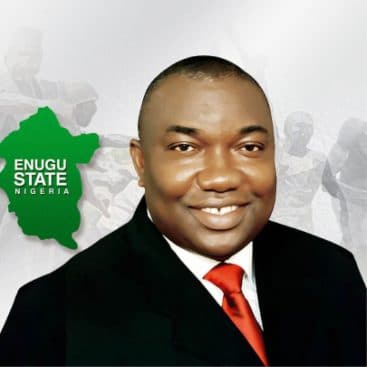ICAN Report And Enugu’s Unprecedented Accountability Status

By Samson Ezea
Making waves recently on several media platforms was the findings and verdicts of the renowned Institute of Chartered Accountants of Nigeria (ICAN) on the financial accountability of the states in Nigeria for the year 2019 in which Enugu State emerged the second best state behind Kaduna State. This was contained in the professional financial body’s 2019 Accountability Index (ICAN- A1) unveiled recently.
Top on the chart according to the Report is Kaduna State with 72.7 percent, followed by Enugu with 58.2 per cent and Jigawa with 55.9 per cent.
According to the Chairman, Steering Committee of the professional financial body, Zakaria Muhammad, who presented the Report during a hybrid event of the body, the best state in term of accountability in Nigeria is Kaduna State with 72.7 per cent, trailing behind Kaduna is Enugu State with 58.2 percent. Jigawa State is the third runner up with 55.9 per cent. The above news story which has been making waves in the mainstream and social media platforms is not and should not be a surprise to many, especially those who have worked, followed, still following and working with Ugwuanyi and his government closely since he came into in 2015.
This is so because this is not the first, second, third and will not be the last time national, international organisations, professional bodies and the media passed or will pronounce such outstanding verdict on Enugu State under Ugwuanyi’s watch. It would be recalled that Enugu was the seventh best in the (ICAN-A1) Report of 2018 in term of accountability. So the State’s second position in the latest Report is an indication of Ugwuanyi government’s remarkable improvement in generating and handling of the state’s finances.
For those who may have easily, hypocritically or mischievously forgotten how Ugwuanyi’s government made the state to attain this enviable height in financial prudence and probity that earned it the latest status of being the second best state in Nigeria in term of accountability, let do a recap, because the feat was not accidental, but a result of hardwork, commitment and sincerity by Ugwuanyi’s administration.
It is of note that from the inception of his administration in 2015, Enugu State Governor Ifeanyi Ugwuanyi understood the enormity of the financial challenges facing his government with the recessed economy and dwindling government revenue. Ugwuanyi quickly brought to bear his managerial acumen and financial wizardry by instilling fiscal discipline, due process, prudence, accountability, reforms and transparency in his government’s handling and managing of the state finances, without minding whose ox is gored.
The State Internally Generated Revenues (IGR) which was before then, open to diversion, looting and corruption was systematically and electronically repositioned, streamlined and strengthened to serve the main purpose of generating revenue for the government. All kind of illegal and double taxation and harassment of residents over tax collections and payment by touts was stopped forthwith.
This hardline decision and action of Governor Ugwuanyi didn’t go down well with those who have benefited immensely from the revenue loopholes at the detriment of the government and the people of the state. Ugwuanyi’s government in its magnanimity and care for the downtrodden granted tax waiver to petty traders, market men and women in the state.
With the plugging of the leakages in the State’s IGR and appointment of a trusted and prominent banker in the person of Prince Emeka Odo, who has been reappointed for second term on merit as Chairman of the State Board of Internal Revenue, Enugu State IGR improved and stabilised tremendously like never before. Not done yet, Governor Ugwuanyi cut down drastically the cost of governance and the razzmatazz, profligacy and wastages that usually characterise government’s activities. He lived by example and avoided uneccessary oversea and national trips with large retinue of aides.
It is on record that since Ugwuanyi assumed office as governor, he has travelled abroad just twice. This is unlike majority of public office holders that pratically runs their offices from abroad or through proxies. Call Ugwuanyi home boy or grassroots governor or leader, you are right. He is not only always available in the state, he is easily accessible and handy. Heperforms his duties as governor with utmost sense of responsibility, sincerity and commitment. He works seven days in a week and almost 24 hours in a day. To him, there is no dull moment and result must be achieved.
Despite the increasing wage bill of the state, following the continous recruitment of workers, especially teachers and health workers, Ugwuanyi’s government made payment of workers’ salaries, a top priority. That is why since 2015 till date, despite the debts and financial challenges his government inherited and faced, workers in the state have continued to receive their salaries every 21st of the month and 13 month every December.
This had helped in improving and stimulating the micro economy of the state, considering that Enugu is more of a civil service state than a commercial hub or oil producing state. Capital projects have been executed and are still being executed across the 450 communities, 260 electoral wards, 17 local government area and three senatorial zones of the state to the happiness and suprise of many. Peace has reigned supreme in the state. The state is secure and investors’ friendly. Economic activities are stable.The people are happy and very supportive of Ugwuanyi’s administration in the state.
Even at the peak of COVID-19 pandemic and its concomitant challenges that crippled the global economy and government revenue, Ugwuanyi was among the first governors in Nigeria to approve the N30,000 minimum wage for workers. He did this at a time many states including Kaduna, Ekiti and others were struggling to meet up with their financial obligations and had announced 50 per cent slash in the salaries of political appointees and workers.
Meanwhile, not too long ago, the inaugural Ceremony the Reconstituted Enugu State Ease of Doing Business Council took place at the Government House, Enugu by H.E Rt. Hon. Ifeanyi Ugwuanyi who was represented by the Secretary To The Enugu State Government, (SSG) Prof. Simon Uchenna Ortuanya.
The event was witnessed by Dr Jumoke Oduwole, Special Assistant to the President on Ease of Doing Business and Secretary of the Presidential Enabling Business Environment Council (PEBEC) and Mr Ayokunnu Ojeniyi, Project Manager Enabling Business Environment Secretariat (EBES).
The Reconstituted Enugu State Ease of Doing Business Council (ES-EoDBC) is chaired by the Executive Governor of Enugu State, represented by the Chief of Staff to the Governor, Rt. Hon. Festus Uzor, while Hon. Chibuzor Okafor, General Manager /CEO Enugu State Investment Development Authority is the State Reform Champion/Focal Person and Secretary to the Council. The Council will implement the State Action Plan (SAP) 2.0 for the Enugu State Ease of Doing Business Reforms.
Lest we may have forgotten, Enugu State emerged the No.1 ranked state in the South East, the 2nd most improved State in Nigeria and 3rd ranked state in Nigeria for starting a business in the World Bank 2018 Ease of Doing Business ranking.
It would be also recalled that in July this year, the popular Economic Confidential, an intelligence magazine in its 2019 Annual States Viability Index (ASVI) unveiled, declared six states in the country, including Enugu State financial viable. Other viable states according to the report include Lagos, Ogun, Rivers, Kwara and Kaduna. Listed as poor and insolvent states were Katsina, Kebbi, Borno, Bayelsa and Taraba. This was based on their poor internally-generated revenue, IGR, which is far below 10% of their receipts from the federation account.
The index proved that without the monthly disbursement from the Federation Account Allocation Committee, FAAC, many states remain unviable, and cannot survive without the federally-collected revenue, mostly from the oil sector. The IGR are generated by states through Pay-As-You-Earn Tax, PAYE, Direct Assessment, Road Taxes and revenues from Ministries, Departments and Agencies, MDAs.
The IGR of the 36 states of the federation totalled N1.3 trillion in 2019, as compared to N1.1 trillion in 2018, an increase of about N200 billion.
The report to many is expected and factual. To some, it is shocking and surprising. Shocking in the sense that with the exception of Rivers, other oil producing states were missing in the list of six viable states in the country, even with their 13 per cent monthly derivation fund. Some states with largest markets and commercial activities are also missing in the list, due to poor management of financial resources and loopholes in their IGR.
So surprising is the fact that Enugu State that is predominantly a civil service and non-oil producing state is among the six viable states in the country.
It is expected and should not surprise anybody to see in the days ahead more laurels and recognitions coming the way of the Enugu State government, Ugwuanyi and his administration. This is considering the fact that the governor and his team have performed creditably well in office, especially in the areas of prudent management of the state’s lean financial resources without any scandal, delivery of democracy dividends and good governance, maintenance and sustenance of peace and unity, spreading of developmental projects and appointments in an unprecedented manner across the state and others.
Ezea, wrote from Independence Layout, Enugu.


